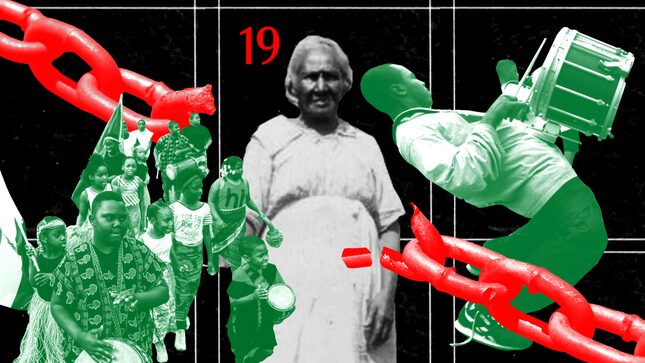The Story of Katie Darling and the Complex Jubilation of Juneteenth
More than a declaration, Juneteenth was a day that America’s dishonesty unraveled
In Depth

Legally, Katie Darling was already free on June 19, 1865, when Major General Gordon Granger arrived in Galveston, Texas, under federal instruction to occupy the Confederate state. Backed by almost two thousand Union soldiers, Granger stood on a balcony in the center of town reading General Orders, No. 3: “The people of Texas are informed that, in accordance with a proclamation from the Executive of the United States, all slaves are free… this involves an absolute equality of personal rights and rights of property between former masters and slaves…” he began.
The announcement was enormous news, but it came to Galveston a full two and a half years after Abraham Lincoln had signed the Emancipation Proclamation and six months after the 13th Amendment, which declared all enslaved African descendants freed, had been passed by Congress. Texas, one of the last outposts of slavery, had over 250,000 enslaved people; in addition, hundreds of thousands of others were forced to migrate there by slave owners in efforts to escape the Union Army. Some in Galveston that day fled town before Major Granger finished speaking, looking to embrace their newfound freedom immediately. Many relished the moment, cherishing the day that would eventually become known as Juneteenth. These annual celebrations, which began in 1866 and have been commemorated ever since, became an occasion freed people would treasure for generations. Juneteenth marked a monumental change in history for African-Americans; historian Elizabeth Hayes Turner explained that it offered “travelers between slavery and freedom to mark a point in their lives, a ‘red spot on the calendar’ that bonded them together as a free people, as Americans.” More than the Civil War’s end, more than the 4th of July, the day gave way to a powerful, collective memory of Black people rallying around their liberation.
But the day wasn’t a simple break with the past, either. Others were targeted for attempting to leave upon the announcement, the former Confederate mayor threatening them for leaving their former masters. Throughout Texas, many plantation owners delayed the news or waited until a government official showed up to enforce the law. Outside the city of Marshall, Katie Darling, 16, would remain on the plantation where she was born into slavery for several more years; her white mistress refused to let her leave until some freed people in Darling’s community organized to secure her freedom. Her story, among others, raised the question for me: how long will freedom for Black people be deferred? A resilient memory in history, Juneteenth is not just a celebration of freedom, but also a reminder of the fight that continues in gaining it.
I’ll never forget the day I learned about Juneteenth. My mother was cooking dinner over the stove, smells of curry chicken wafting through the air as I told her about my school day. I was eight at the time, and my fourth-grade class had just begun to learn about slavery. My mom, as usual, had me go over the details.
“Ms. Brown said that Abraham Lincoln signed the Emanpisation Procklapation,” I told her.
“Abraham Lincoln didn’t free the slaves,” she replied with frustration. “The Emancipation Proclamation didn’t free them either. Black people freed themselves.”
That night, my mother would search the internet with me so I could learn more about Juneteenth, showing me pictures of celebrations and looking at recorded stories from former slaves. As I began to celebrate the holiday in the years thereafter, it was the story of Katie Darling that stuck with me the most. Darling was born into slavery in 1849, telling her story at 88 years old to interviewers as part of a WPA Federal Writers’ Project, recording oral histories from the formerly enslaved. She grew up with three brothers, Peter, Adam, and Willie; their mother died in slavery and their father escaped North. Her labor included wet-nursing and caring for the plantation owner’s children, as well as milking the cows.
“Abraham Lincoln didn’t free the slaves,” she replied with frustration. “The Emancipation Proclamation didn’t free them either. Black people freed themselves.”
Speaking decades later, she still vividly remembered the battles of the Civil War, when Union and Confederate soldiers met at Mansfield: “Massas’s field am all tore up with cannon holes and ever’ time a cannon fire, missy go off in a rage. One time when a cannon fire, she say to me, ‘You li’l black wench, you niggers ain’t gwine be free. You’s made to work for white folks.’” When her master came back at the end of the war, he planned to abide by the order to let them go. But her mistress was determined to defer her freedom even further. Even with the order of emancipation, Darling stayed at the plantation: “Missy whip me after the war jist like she did ’fore,” she said. It was years before she would escape.
Juneteenth, also known as “Jubilee Day,” commemorates the last place that freedom reached the enslaved. Beginning in Texas, the holiday’s first celebrations involved community gatherings centered around church services, readings of the Emancipation Proclamation, and political rallies. During the early 20th century, the holiday would become more popularized and shift into what it largely is today, including street fairs, food, music, and historical reenactments. With the Great Migration especially, the celebration traveled North and across the country. Most states now observe it as a holiday or day of observance.
-

-

-

-

-

-

-

-

-

-

-

-

-

-

-

-

-

-

-

-

-

-

-

-

-

-

-

-

-

-

-

-

-

-

-

-

-

-

-

-








































